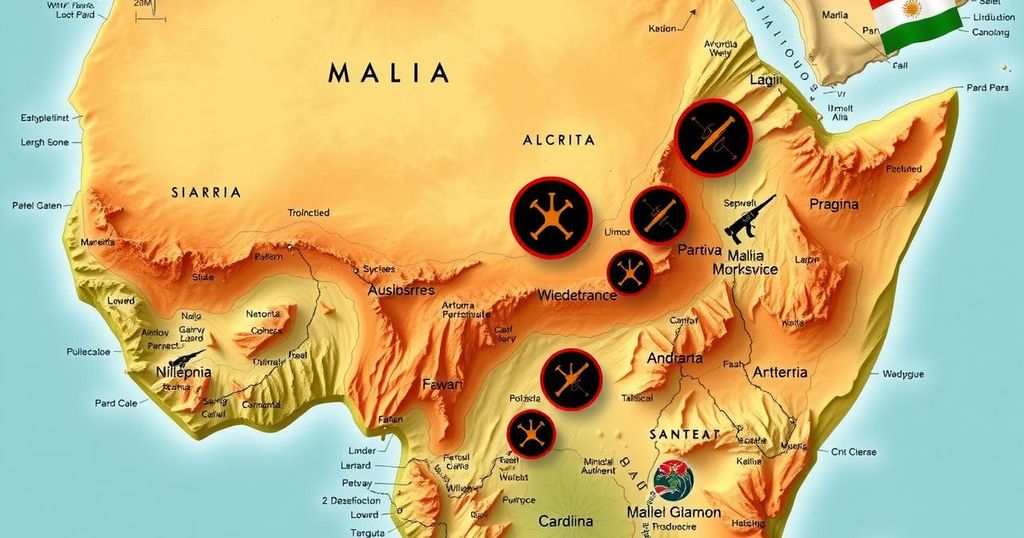Wagner Replaced in Mali by Russian-Controlled Africa Corps

The Russian group Wagner has officially withdrawn from Mali after three and a half years, with its operations being taken over by the Africa Corps, also controlled by the Kremlin. Officials in Bamako have not confirmed the departure, instead referring to the forces as Russian instructors. This change comes amidst rising jihadist attacks in Mali and ongoing accusations of human rights abuses by Wagner affiliates.
The Russian paramilitary group Wagner is officially withdrawing from Mali after a three-and-a-half-year presence in the nation. Diplomatic sources reported that its units are being replaced by the Africa Corps, another military group under Kremlin control. An official stated, “Officially, Wagner is no longer present in Mali. But the Africa Corps is stepping up,” highlighting this transition clearly.
A Telegram account associated with Wagner announced the change with a straightforward message, declaring, “Mission accomplished. PMC Wagner is going home.” However, officials in Bamako, the capital, haven’t confirmed or denied this shift. The Malian junta has long referred to Russian fighters as “Russian instructors,” avoiding acknowledgment of Wagner’s presence.
Mali has faced an insurgency for over a decade, grappling with armed groups linked to al-Qaida and the Islamic State. Since military coups in 2020 and 2021, the nation has transitioned from relying on France—its former colonial power—to seeking military support from Russia. This came after the last French troops left Mali in 2022, sown by souring relations with the junta, and rising anti-French sentiment.
Wagner, well-known for its operations globally, underwent restructuring after its leader, Yevgeny Prigozhin, was killed in a plane crash in August 2023 following a brief revolt. Sources indicate that while Mali has never openly acknowledged Wagner, the interactions have always pointed toward a deeper Kremlin influence in their military operations.
“The Kremlin remains in control,” said a diplomatic source, adding that many personnel from Wagner will be reintegrated into Africa Corps. The Africa Corps is seen not just as a successor to Wagner but also as an active military force aiding various African governments.
Mali has relied heavily on Wagner for combating jihadist violence that has devastated large parts of the country. A security source remarked, “Wagner yesterday or Africa Corps today, our point of contact remains the same, it is the central power in Russia, that is to say the Kremlin.” The question remains, however, how effective Africa Corps will be given the recent surge in jihadist assaults targeting the Malian Armed Forces.
Following allegations from human rights organizations regarding the brutality of Wagner’s methods, there are significant concerns about how Africa Corps will operate. Reports are rife about civilians being deliberately targeted during anti-terror operations. A 2022 UN report claimed that at least 500 people were executed in an anti-jihadist sweep, a charge the Malian junta has denied. Meanwhile, Human Rights Watch accused both the Malian military and Wagner of executing civilians, underlining the severity of the situation.
The transition from Wagner to Africa Corps arrives at a precarious moment, as Mali’s Army faces what it calls a “resurgence” of jihadist activity, having recently suffered attacks that resulted in numerous casualties among soldiers—a stark reminder of the complexities and brutalities associated with the conflict.
In conclusion, Wagner’s departure from Mali marks a significant shift toward the Africa Corps, as Russia continues to assert its influence in the region’s military affairs. The implications of this transition remain uncertain, particularly regarding continued support against jihadist threats. The ongoing human rights concerns and the Malian junta’s previous deflections regarding foreign military presence also cast shadows over what the future holds for security in Mali.
Original Source: www.inkl.com







